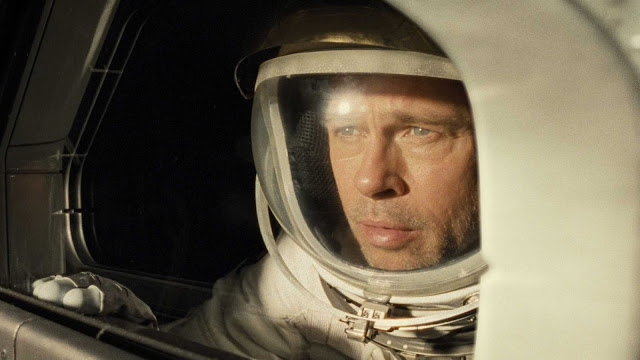Ad Astra: Neon Movie Review
More a Freudian rumination on masculinity that's set in space, James Gray's Ad Astra takes on the vast reaches of the great beyond and delivers a stunning piece of world-building as ever there's been on a universal scale.
A restrained and almost muted Pitt is Roy McBride, the son of an accomplished astronaut Cliff McBride (Lee Jones). Constantly living in his shadow, Roy is sent to find the missing McBride senior who's presumed lost in space somewhere near Neptune, after a series of electrical surges threatens to wipe life from the solar system.
But there's ambiguity over whether McBride senior is to blame for the surges or is trying to stop them...All of which puts the father and son on a collision course both have clearly been trying to avoid their entire lives.
Gray and Pitt conjure up a world in the near future that's as believable as anything seen in the likes of Gravity and 2001: A Space Odyssey.
With vertiginous shots early on giving way to more intimate and internal moments, Gray's film ponders on what it's like to be man, how to deal with an estranged father and how to connect to others. (There's a delicious irony the space mission is about finding life outside of Earth when it's more ground-bound matters that anchor the movie.)
Pitt's muted throughout, prone to his inner monologue rather than espousing reams of dialogue; and when the break comes somewhere in the film, Pitt delivers an emotional range that's as devastating to his character as it needs to be to the audience.
Gray's space world is fascinating - and while there are moments of action set on the moon and thanks to the unease of an unexpected mayday call, the slow calculated script and delivery thereof lead to plenty of payoffs.
It's not perfect though - while the mundanities of commercial space travel are recreated with ease (fast food companies and their neon signs sit along the likes of Virgin on the Moon), some of the script fails its women. Tyler gets a thankless role as a faceless wife (though this is perhaps the point given how Pitt's character can't connect with others in his life) and Ruth Negga shines all too briefly as the conspiracy elements of the mystery are ratcheted up on Mars.
The film delivers much subtlety on male relationships, but it's also content to dispatch some rote lines such as the double-edged "We are all we've got" to satiate those less inclined to the more thoughtful leanings of what's on screen.
Ultimately, Ad Astra works best in its first two thirds - its delivery of some answers and some leaps of logic in the latter stages cause the foundations to flounder.
However, in terms of a rumination on the folly of man, it's second to none - and one of the most arrestingly visual, thoughtful and immersive well-executed experiences that cinema has had to offer.


.jpg)


%20&%20Edith%20Poor%20(Lizzie%20Moyle)_%C2%A9BBCS%20&%20Bunya%20Entertainment.jpg)
No comments:
Post a Comment